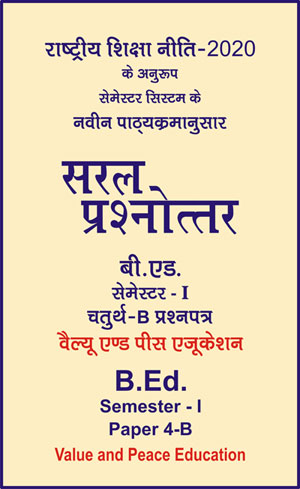|
बी एड - एम एड >> बी.एड. सेमेस्टर-1 प्रश्नपत्र-IV-B - वैल्यू एण्ड पीस एजुकेशन बी.एड. सेमेस्टर-1 प्रश्नपत्र-IV-B - वैल्यू एण्ड पीस एजुकेशनसरल प्रश्नोत्तर समूह
|
5 पाठक हैं |
||||||
बी.एड. सेमेस्टर-1 प्रश्नपत्र-IV-B - वैल्यू एण्ड पीस एजुकेशन (अंग्रेजी भाषा में)
Question- What do you understand by Positive and Negative Values? Examine critically the role of education in balancing them.
Answer -
Positive and Negative Value
There may be a distinction between positive and negative philosophic or ethic value. While positive ethic value generally correlates with something that is pursued or maximized, negative ethic value correlates with something that is avoided or minimized.
Negative value may be both intrinsic negative value and/or instrumental negative value.
Positive value applies to things or qualities which are good, desirable or worthwhile, for example, a student who respects self, the constituted authority, seniors and even the classmate is said to have positive value. Other positive value include; gratitude, truth telling, hard work, obedience etc.
Negative values are one of the deepest pains of being human and is poisonous :
- Anger.
- Discouragement.
- Anxiety.
- Disinterest.
- Humiliation.
- Rejection.
- Jealousy.
- Failure.
Education and Values
Education is not only about training of minds but also for the purity of heart and self-growth. Values constitute an integral part of the process of education. An emphasis on values, while talking about education, does not imply that something extra and additional is being stressed on. The process of education inherently involves transmission of values. As held by Seshadri (2005), "education is a process of bringing about desirable changes in the way one thinks, feels, and acts in accordance with one's concept of good life." However, as Seshadri rightly maintains, the transmission of values does not imply passive conformity, submission, and blind obedience to the values passed on by adults. Education shall not be a process of authoritarian training of dogmas. Education needs to encourage critical and reflective thinking, rational selection and conscientious behaviour. Emphasis on values in education makes pupils good professionals as well as whole human beings too. It makes them not only capable of earning anna (food) but also gives them ananda (happiness). It is said that knowledge is what helps us to attain liberation: Sa Vidya Ya Vimuktaye.
Education needs to respond constructively to the twin concerns of individual and societal well-being. We are simultaneously individuals as well as social beings. Interdependence and complementarity are the valuable key features of today’s world (Misra, 2006). A holistic vision that allows for a positive expression of universal human spirit characterised by the ideal of the ‘whole world as a family’ (Vasudhaiva kutumbakam) is the need of the hour. This age old Indian ideal recognises the possibility of conceiving the entire world as a cohesive structure of a family in which mutuality, interdependence and collaboration are practised. Today when globalisation is becoming a major force, interdependence is becoming increasingly more and more important. The indigenous system of education in India lays unambiguous emphasis on universal values like compassion, non-violence, righteous conduct, forgiveness, tolerance, sacrifice, and benevolence. These values were made part of the practices of teaching-learning in such a manner that a person coming out of the system naturally imbibed the values as part of his/her life style. As mentioned earlier, the discourse on values has revolved around the notion of four broad life goals or purusharthas. The instructions given by the teacher to students, after completion of the studies, included observing truth, following dharma, do no harm to truth, respect mother, respect teacher, respect guests, follow only good deeds of others and not other activities (Satyam vad, Dharmam char, Satyanna pramaditavyam, Matri devo bhava, Acharya devo bhava, Atithi devo bhava, Yanyanvadyani karmani tani sevitavyani netarani). These values primarily emphasise the standards of conduct and relate to the significant others. The goal is to create a productive and harmonious life for the individual and society.
|
|||||













